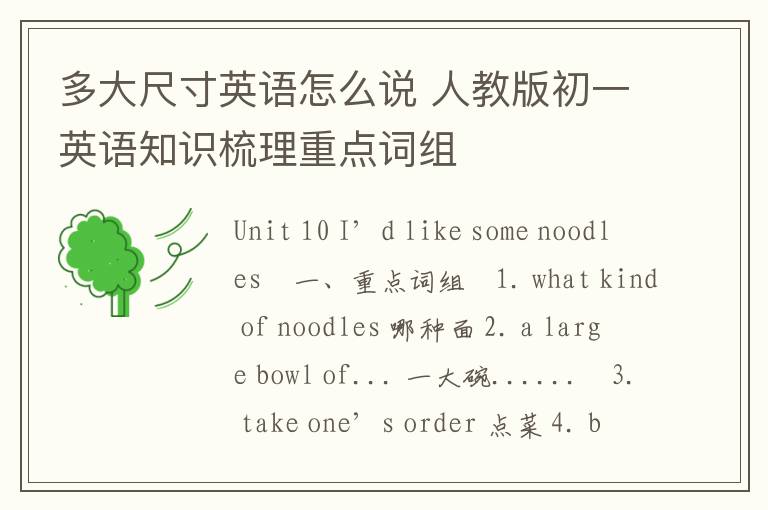
Unit 10 I’d like some noodles
一、重点词组
1. what kind of noodles 哪种面 2. a large bowl of... 一大碗......
3. take one’s order 点菜 4. beef noodles with carrots牛肉胡萝卜面
5. around the world 世界各地 6. in different countries 在不同的国家
7. birthday cake 生日蛋糕 8. the number of candles 蜡烛的数量
9. make a wish 许愿 10. blow out 吹灭
11. in one go 一口气 12. come true 实现
13. get popular 受欢迎,流行 14. bring good luck to... 给......带来好运
15. different kinds of 不同种类的 16. don’t worry 别急
二、知识点
1. -- What would you like? 你想要什么?
-- I’m not sure yet. 我还不确定。
(1)would like 和want都表示“想要”
would like sth. = want sth. 想要某物
would like to do sth. = want to do sth. 想要做某事
would like sb. to do sth. = want sb. to do sth. 想要某人做某事
(2)yet意为“还,仍然”,一般用于否定句、疑问句中。
2. -- Are there any vegetables in the beef noodles? 牛肉面里面有蔬菜吗?
-- Yes, there are some tomatoes. 是的,里面有一些西红柿。
(1)Are there...?是there be句型的一般疑问句形式,用来询问是否有某物或某人,be
动词的单复数由后面主语的单复数来决定。
(2)any用于疑问句和否定句,肯定句中用some。注意:表示请求或建议时,一般
用some而不用any。
例:Can I have some oranges? 我能要点橘子吃吗?
3. May I take your order? (请问您)可以点菜了吗?
(1)order此处作名词,意为“点菜,订购”。
(2)order也可以做动词,表示“点餐;命令”
例:What would you like to order? 您想点什么菜?
She ordered me to leave. 她命令我离开。
4. What size would you like? 你想要多大(碗)的?
what size用来询问物体的尺寸、大小,意为“多大尺寸/号码”。
例:What size do you wear? 你穿什么尺码?
5. The answer would be different in different countries. 在不同国家会有不同的答案。
(1)answer在此处作名词,意为“答案,答复”。
(2)answer还可作动词,意为“回答”。
例:Can you answer my questions? 你能回答我的问题吗?
6. The number of candles is the person’s age. 蜡烛的数量就是这个人的年龄。
(1)the number of意为“......的数量”,后跟名词复数。作主语时,谓语动词用单数。
例:The number of the students in the class is 45. 班里的学生人数是45人。
(2)a number of意为“许多”,后跟名词复数。作主语时,谓语动词用复数。
例:A number of students like English. 许多学生喜欢英语。
7. The birthday person must make a wish and blow out the candles. 过生日的人必须许愿和吹灭蜡烛。
(1)make a wish意为“许愿”,wish此处作名词,指“心愿,愿望”。
(2)wish还可以作动词,意为“希望;祝愿”
例:I wish to have a new car. 我希望有辆新车。
I wished her a happy birthday. 我祝他生日快乐。
8. If he or she blows out all the candles in one go, the wish will come true. 如果他(她)
一口气把蜡烛都吹灭,许的愿望就会实现。
(1)if是连词,意为“如果”,引导条件状语从句。当主语是一般将来时态时,if引导的条件状语从句要用一般现在时,也就是“主将从现”。
(If he or she blows out all the candles in one go), (the wish will come true).
从句 一般现在时 主句 一般将来时
例:If it doesn’t rain, we will have a picnic. 如果明天不下雨,我们就野餐。
(2)in one go = at one go,意为“一下子,一口气”。
9. All of these birthday foods may be different. 所有的这些生日食物可能都不同。
(1)food表示“食物”时,一般为不可数名词。当food表示食物的种类时,看做可数名词。此处birthday foods表示“各种各样的生日食品”。
(2)情态动词may表示“可能,也许”。
例:He may be at home now. 他现在可能在家里。
拓展:may be和maybe
maybe意为“可能,也许”
may be意为“可能是”
例:Maybe he is a teacher. 可能他是个老师。
He may be a teacher. 他可能是个老师。
10. They bring good luck to the birthday person. 它们把好运带给过生日的人。
luck是不可数名词,意为“运气,好运”,其形容词为lucky,意为“幸运的”,副
词为luckily,意为“幸运地”。
(1)I wish you good luck. 我祝你好运。
(2)You are so lucky. 你真幸运。
(3)Luckily, he won the competition. 幸运的是,他赢得了比赛。